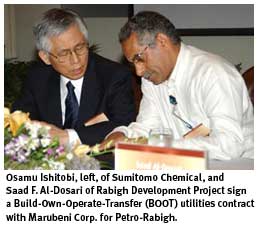Consortium Set for Rabigh Utilities
Posted: 15 August 2005
 Send this article Send this article
An agreement was signed Aug. 7 authorizing a consortium led by Japan's Marubeni Corp. to build, own and operate for 25 years industrial plants to produce desalinated water, electrical power and steam for Rabigh Refining & Petrochemical Co. (Petro-Rabigh).
Hosting the event was Hamad M. Balhareth of Saudi Aramco, project manager of Rabigh 3rd Party Pr ojects Division of Saudi Aramco's Rabigh Industrial Development Department.
 Petro-Rabigh is an integrated refining and petrochemicals joint venture between Saudi Aramco and Japan's Sumitomo Chemical Co. Partners with Marubeni Corps., 30 percent, in the newly inked Rabigh Independent Water, Steam and Power (IWSP) Pr oject are JGC Corp., 25 percent, and Itochu Corp., 20.1 percent, both of Japan; Arabian Co. for Water and Power Development Ltd. (ACWA Power), 23.9 percent, of Saudi Arabia; and Petro-Rabigh, 1 percent. Petro-Rabigh is an integrated refining and petrochemicals joint venture between Saudi Aramco and Japan's Sumitomo Chemical Co. Partners with Marubeni Corps., 30 percent, in the newly inked Rabigh Independent Water, Steam and Power (IWSP) Pr oject are JGC Corp., 25 percent, and Itochu Corp., 20.1 percent, both of Japan; Arabian Co. for Water and Power Development Ltd. (ACWA Power), 23.9 percent, of Saudi Arabia; and Petro-Rabigh, 1 percent.
Two documents - the Water and Energy Conversion Agreement (WECA) and the Engineering, Pr ocurement and Construction (EPC) support agreement - were signed by Saudi Aramco officials and consortium principals at the Saudi Aramco Exhibit ceremony.
The consortium principals also signed a lump-sum-turnkey (LSTK) contract to engineer and construct the plant facilities with Mitsubishi Heavy Industries, Ltd. (MHI), of Japan , and Ichiro Fukue, executive vice president and representative director, signed that document for MHI.
The WECA signatories were: Saudi Aramco - Saad F. Al-Dosari, acting executive director, Rabigh Development Pr oject; Sumitomo Chemical Co. - Osamu Ishitobi, senior executive officer, Rabigh Pr oject Office; Marubeni Corp. - Shigeru Yamazoe, senior operating officer, Plant Power and Infrastructure Pr oject Division; JGC Corp. - Shuhei Maruyama, executive officer, deputy senior general manager, Business Development and Pr omotion Division; Itochu Corp. - Kazuo Tanaka, general manager, Utility Solution Business Development; and ACWA Power Pr ojects - Mohammad A. Abunayyan, chairman, ACWA Power.
The core document of the IWSP project, the WECA, will govern the relationship between Petro-Rabigh and the Utilities Co., which will be formed by the consortium, providing the framework for the overall project and defining the rights and obligations of the parties involved.
The EPC support agreement governs the relationship between partners and the Utilities Co. during the initial construction period prior to signing of IWSP's financial agreements.
According to Balhareth, the Petro-Rabigh project will be capable of generating a combined 360 megawatts (MW) of electrical power, 1,245 tons of steam per hour, and 5,580 tons of desalinated water. Major components of the complex will be five 122-MW steam turbines; nine 470-ton-per-hour steam generators; and an 18-train, three-pass reverse osmosis desalination plant.
A back-up power supply from the existing Saudi Electricity Co. connection will be available for testing and start-up power and other ancillary services.
The project is structured on a Build, Own, Operate and Transfer basis, known as BOOT, which was first implemented by Saudi Aramco on a 2003 co-generation project. Under BOOT terms, the Utilities Co. will transfer the IWSP facility to Petro-Rabigh, at no cost, after the 25-year agreement ends.
At the end of the signing ceremony Aug. 7, Rabigh project executive director Al-Dosari said: "The signings of Petro-Rabigh joint venture agreement and this agreement mark major milestones for Saudi Aramco and Sumitomo Chemical." On Aug 1, Saudi Aramco and Sumitomo signed the Petro-Rabigh joint venture agreement.
Signatory Yamazoe of Marubeni Corp. said, "It is an honor to be part of this landmark project, which is a testament to the strong bond between our two countries."

Posted by Editor Pipeline Magazine
Replication or redistribution in whole or in part is expressly prohibited without the prior written consent of Reflex Publishing ME FZ LLC.
Send press release to info@pipelinedubai.com |



